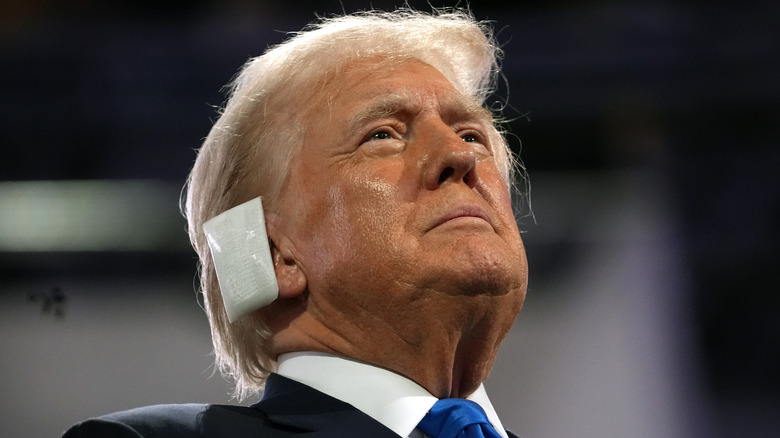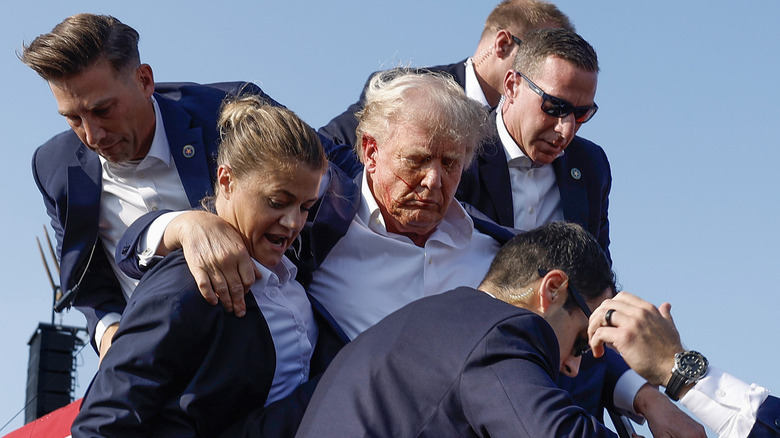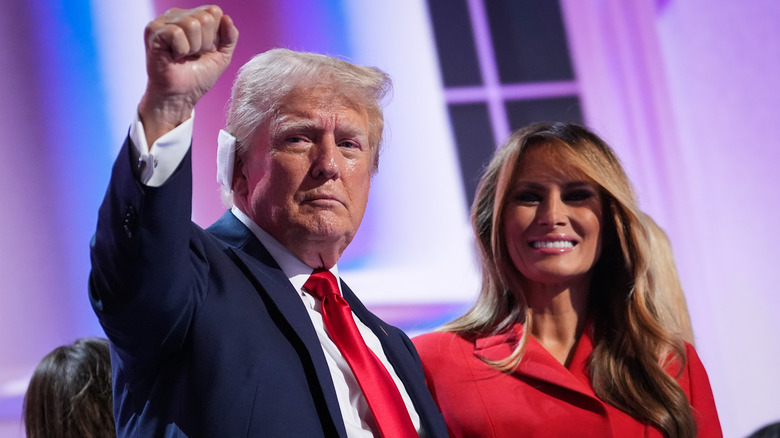Donald Trump's Doctor Explains Why Ex-President's Bullet Wound Still Requires Bandage
On July 13, 2024, former President Donald Trump survived an assassination attempt during his Butler, Pennsylvania rally. Immediately after the shooting that left one man dead and two other attendees injured, Trump appeared to be bleeding from the side of his head as the Secret Service rushed him off the stage. He has since been seen wearing a bandage on his right ear — and now, his doctor, Rep. Ronny Jackson, has issued a statement on the former U.S. leader's healing journey.
In a memo shared by TMZ, Jackson, Trump's former White House physician, wrote, "The bullet passed, coming less than a quarter of an inch from entering his head, and struck the top of his right ear." He continued, "The bullet track produced a 2 cm wide wound that extended down to the cartilaginous surface of the ear. There was initially significant bleeding, followed by marked swelling of the entire upper ear." While Jackson noted that the swelling has since dissipated, Trump's ear continues to occasionally bleed as it "begin[s] to granulate and heal properly." "Based on the highly vascular nature of the ear, there is still intermittent bleeding requiring a dressing to be in place," Jackson confirmed. "Given the broad and blunt nature of the wound itself, no sutures were required."
While we now know the bullet came dangerously close to striking Trump in the head, Jackson's July 20 statement was the first thorough account the presidential candidate's campaign provided in the days following the assassination attempt.
Donald Trump will undergo further evaluations
Prior to Rep. Ronny Jackson's official statement on Donald Trump's healing journey, the presidential candidate's campaign remained rather tight-lipped about his condition. As Jonathan Reiner, a professor of medicine and surgery at The George Washington University, wrote on X, formerly known as Twitter, "It's an understatement to say that it's bizarre that a presidential candidate has sustained an injury from an attempted assassination and no medical report is issued to describe his evaluation and the extent of his injury." Thus, it was only a matter of time before the Trump camp felt obligated to provide a more clear, definitive public assessment of the former president's heath status.
In the hours after Trump's assassination attempt, the former commander-in-chief took to his social media platform Truth Social to share details about the event. "I was shot with a bullet that pierced the upper part of my right ear. I knew immediately that something was wrong in that I heard a whizzing sound, shots, and immediately felt the bullet ripping through the skin," Trump wrote. "Much bleeding took place, so I realized then what was happening."
While Jackson later met up with the former president at his private residence in Bedminster, New Jersey, to "personally check on him," Trump was initially treated by doctors at Butler Memorial Hospital in Butler, Pennsylvania, where the rally in question took place. "They provided a thorough evaluation for additional injuries that included a CT of his head," Jackson wrote. "He will have further evaluations, including a comprehensive hearing exam, as needed."
RNC attendees donned 'bandages' to show support
Days after his assassination attempt, Donald Trump returned to the spotlight at the 2024 Republican National Convention, where he officially accepted his party's nomination for president of the United States. Here, the presidential candidate's slew of supporters showed their solidarity by donning "bandages" over their ears.
As Dr. Catherine Nobile, a clinical psychologist in New York, told Business Insider, wearing a fake bandage and wearing a "Make America Great Again" hat aren't all that different, as "it facilitates a sense of belongingness and a sense of connection." She added that this "performative act of imitation" in the wake of distress serves as a coping mechanism for all those who were impacted by the alarming event. Known as co-regulation, Nobile said these fake bandages "create a sense of understanding and belonging that can calm the nervous system," much like hugging. "Not every Trump supporter can come and hug one another," Nobile continued. "The ear piece that they're all putting on, it could be a symbol in an effort to co-regulate as a community."
After all, as Arizona delegate Ray Michaels told AP News, "We realized that this was a tragedy that should never have happened, and we want [Trump] to know that we are going through this with him." There's no doubt this symbolic accessory represents the emotional healing Trump's entire base has endured in the wake of his near-death experience.


